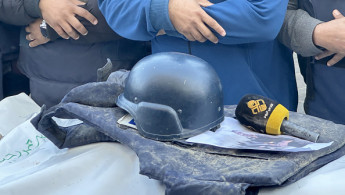CPJ slams Israel for smearing Palestinian journalists killed in Gaza war
Israel must stop claiming that Palestinian journalists killed in Gaza were terrorists or engaged in military activity, an international media organisation said on Wednesday.
The Committee to Protect Journalists (CPJ) slammed Israel for repeatedly making "unproven claims" against journalists its forces have killed and called for independent investigations.
Some 113 journalists and media workers were confirmed killed throughout ten months of the war, according to CPJ - although Palestinian sources report far higher figure.
According to the CPJ, 108 Palestinian journalists, three Lebanese and two Israelis have been killed, while 52 Palestinian journalists had been detained by Israeli forces.
Gaza has become the most dangerous place in the world to be a journalist with the conflict making the highest number of media workers killed than in any other conflict globally, according to rights groups.
Journalists, like medical workers, receive special protection in war zones under the Geneva Conventions.
Amid global condemnation, Israel has attempted to claim that those killed have been members of Palestinian armed groups such as al-Qassam Brigades or al-Quds Brigades of Islamic Jihad.
But these claims have been swiftly rejected by media organisations as well as friends and family of those killed.
"Even before the start of the Israel-Gaza war, CPJ had documented Israel’s pattern of accusing journalists of being terrorists without producing credible evidence to substantiate their claims," said CPJ Program Director Carlos Martínez de la Serna.
"Smear campaigns endanger journalists and erode public trust in the media. Israel must end this practice and allow independent international investigations into the journalists’ killings."
Last month, an Israeli strike killed Al Jazeera Arabic correspondent Ismail al-Ghoul and freelance camera operator Rami al Refee who were reporting near Gaza City on the aftermath of the death of Hamas chief Ismail Haniyeh.
US-based CPJ condemned the killing of Ghoul and Refee, saying "Israel must explain why two more Al Jazeera journalists have been killed in what appears to be a direct strike".
Israel later claimed that al-Ghoul was an engineer with Hamas – which was rejected by Al Jazeera Arabic.
The outlet pointed out that the documents Israel presented stated that al-Ghoul received a Hamas military ranking in 2007, when he would have been 10 years old. He had also been detained in March during a raid on al-Shifa hospital and was cleared for release by the Israeli army.
Israel has killed other Al Jazeera journalists in Gaza including Hamza al-Dahdouh, the son of Al Jazeera's Gaza Bureau Chief Wael al-Dahdouh. He was killed by a drone alongside Mustafa Thuraya.
Wael al-Dahdouh was also injured by an Israeli airstrike while he was covering the war and his cameraman Samer Abu Daqqa was killed.
Israel attempted to claim that Hamza was engaged in military activity and "posed a threat". But an investigation by the US newspaper The Washington Post found "no indications that either man was operating as anything other than a journalist that day".
The newspaper also found that Hamza had been previously authorised to leave Gaza early on in the war which is unlikely to have been granted "to a known militant".
CPJ also called on Israel to allow international media organisations to access Gaza. The blockade has not only endangered Palestinians reporting on the ground but is harming reporting efforts and investigations into alleged atrocities.
In July, dozens of media outlets, including BBC News, The New York Times, the AFP news agency, Arab Reporters for Investigative Journalism, and the European Federation of Journalists signed an open letter called on Israel to open access.
"The result is that information from Gaza is becoming harder and harder to obtain and that the reporting which does get through is subject to repeated questions over its veracity," the letter read.
Rights groups have warned that the Israeli blockade is part of a wider attempt to censor coverage of the war.
Israel has consistently targeted journalists in its war on Gaza which, since 7 October, has killed more than 39,400 Palestinians, most of them women and children and left a further 91,128 injured.




 Follow the Middle East's top stories in English at The New Arab on Google News
Follow the Middle East's top stories in English at The New Arab on Google News

![A group of Palestinians, foreign and Israeli activists gather to participated in an olive picking event on the land in the town of Battir, which is under threat of confiscation by Israel in Bethlehem, occupied West Bank on 8 November 2024. [Getty]](/sites/default/files/styles/image_330x185/public/2182930803.jpeg?h=199d8c1f&itok=__0LgGsa)
